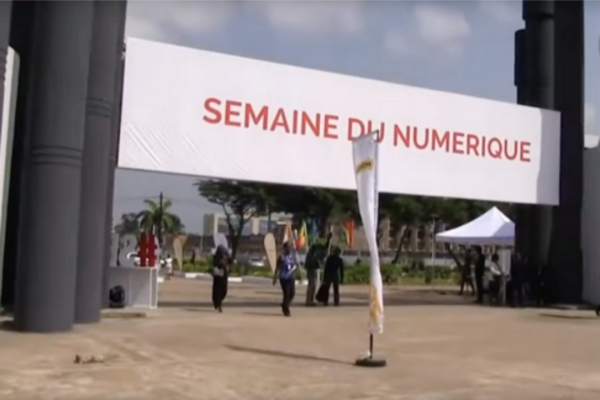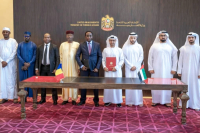
Brief (434)
On Wednesday, October 25, the Guinean Ministry of Technical Education, Vocational Training and Employment announced the signing of a memorandum of understanding with the Chinese technology firm Huawei. The aim is to build smart classrooms at the Kindia Vocational Center and Camara Laye in Conakry.
On Wednesday, October 18, Benin’s Ministry of Digital Affairs and Digitizationannounced the 2023 edition of itsyearlyevent SENUM (Digital Week) wouldbeheldfromNovember 6 to 10 at the Congress Center of Cotonou. This year, the eventwillbeheldaround the theme “Emerging technologies to accelerate the digital transformation of States.”
The Mauritian government recently announced that new mobile identification measures would become enforceable on October 31, 2023.
According to authorities, from the aforementioned date, all current cell phone subscribers will have to re-register their SIM or Esim cards. The main aim is to ensure that every SIM card in use is registered in the name of the individual using it, thereby strengthening subscriber protection against identity theft, various forms of fraud, and malicious practices.
The Uganda Revenue Authority (URA) recently unveiled its Digitalisation and IT Strategy 2023/24-2027/28.
This five-year strategy aims, among other things, to improve services to taxpayers, modernize URA systems, streamline online services, and develop a high-performance, diverse workforce, all thanks to cutting-edge technologies. It also aims to create a reliable, secure, and interoperable digital environment that makes it easier for taxpayers to meet their tax obligations.
The Chamber of Information Technology and Telecommunications (CIT), the sponsor of Egypt's digital industry, is currently participating in GITEX Global 2023 with 19 Egyptian tech companies.
The said companies are currently showcasing their expertise to other participants in Dubai. The aim is to establish partnerships with international companies and explore the latest trends and innovations in the communications and information technology sector.
iiDENTIFii, a startup that developed facial authentication technology for smartphones and computers, announced last week the signing of a partnership with Zambia National Commercial Bank (ZANACO). The partnership aims to roll out the startup’s ID solutions in Zambia. "In Zambia, we aim to address challenges related to digital exclusion, limited access to services, and identity fraud. Many individuals across the continent lack recognized identification, which hampers their access to banking, healthcare, and government services,” explained Gur Sheva, founder of iiDENTIFii.
On the sidelines of the Regional Cybersecurity Week Abu Dhabi, October 8 to 13, Chad's Minister of Telecommunications and Digital Economy, Mahamat Allahou Taher, and the head of the UAE government's Cybersecurity Council, Mohamed Hamad Al Kuwaiti, signed a memorandum of understanding.
Under the terms of the agreement, the two countries will collaborate in the fields of cybersecurity, the fight against cybercrime, and international cooperation in cyber matters, among other things.
Last week, French development agency AFD announced the ten African startups that won the 2023 edition of the AFD Digital Challenge. They are Adinkra (Cameroon), Colorfol (Cameroon), Vortex (Nigeria), Aflamin (Morocco), IAMNATIV (Uganda), SkanTicket (Ivory Coast), ShazaCin (South Africa), SongBoost (Kenya), AkooBooks (Ghana) and Oroko Radio (Ghana).
Cue, a South African startup developing AI-enabled customer service solutions, announced on Thursday, October 12 the successful completion of a $500,000 funding round. The funds will help enhance its technology, now providing companies with faster customer service thanks to next-generation AI models.
Egyptian insurtech company Amenli announced on Monday, October 9 the successful completion of a $1 million financing round. The deal was led by Alter Global, a venture capital fund focused on emerging markets, with the participation of Qatar Insurance Group and Digital Ventures Partners. The funds will be used to develop its technology and accelerate growth.
More...
In Ethiopia, the National Identification Program Office, the Refugees and Returnees Service (RRS), and the Office of the United Nations High Commissioner for Refugees (UNHCR) signed a memorandum of understanding last Friday, October 6.
The agreement aims to provide a national digital ID to some 90,000 refugees and returnees in the country over the next three years. The aim is to enable access to government services and benefits for the refugees and returnees.
Liquid Intelligent Technologies, a subsidiary of pan-African technology group Cassava Technologies, announced on Tuesday, October 10 its partnership with wingu.africa, a pioneering provider of carrier-neutral data center services in Tanzania.
The new partnership aims to launch a second Azure Stack in Tanzania, offering local businesses access to cutting-edge cloud solutions and the means to thrive in the digital age.
On Monday, October 2, Tanzanian authorities inaugurated the Center for Competence in Digital Education (C-CoDE), the fruit of collaboration between Morocco's Mohamed VI Polytechnic University (UM6P) and Switzerland's Ecole Polytechnique Fédérale de Lausanne (EPFL).
The center, hosted by the Nelson Mandela African Science and Technology Institution (NM-AIST), was built thanks to an endowment of over $100,000 from the United States. Among other things, the center will support the digital transformation of training and education practices in Tanzania and the East African Community (EAC).
On Tuesday, September 26, P1 Ventures, a venture capital firm investing in high-potential African companies with a regional or even global client base, announced the first close, at $25 million, of its second investment fund.
P1 Ventures, which has been in operation for 3 years and has backed some 20 African companies, intends to continue its financing activity, focusing more specifically on startups that rely on AI to develop their businesses.















